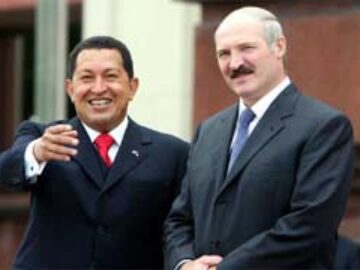The Washington Post: Chávez to fight US with help of Lukashenka and Russian arms

Influential American The Washington Post runs about a recent visit of Russian president to Venezuela and arms supplies to this country. According to the newspaper, Hugo Chávez intents on building alliances with American adversaries, including Belarus.
The arrival of Russian President Dmitry Medvedev and a naval squadron in Venezuela this week is an unequivocal message to President-elect Barack Obama, The Washington Post supposes. Political analysts say his most nettlesome challenge in the Americas will be Venezuela’s populist government and its oil-fueled crusade against US influence, Juan Forero writes.
“President Hugo Chávez, who once called President Bush “the devil”, has held out his hand to Obama and expressed a willingness to reengage Washington after expelling the US ambassador in September,” the author writes. But despite Chávez’s conciliatory words, Obama faces the task of blunting the pretensions of a country intent on building alliances with American adversaries, including Iran and, critics say, Marxist guerrillas in neighboring Colombia.
The author of the article thinks Venezuela poses no strategic risk. Chávez, though, has worked energetically this decade to fill the vacuum created by declining US influence in Latin America, a product of Bush administration policies that were unpopular here. In the process, Chávez has become perhaps the world’s most vocal anti-American leader, the edition notes.
According to the newspaper, Venezuela has entered into economic agreements with President Alyaksandr Lukashenka of Belarus and signed contracts worth $4.4 billion to buy arms from Russia. Venezuela has built a tight alliance with Nicaragua’s Daniel Ortega and has subsidized oil sales to Cuba.
In September, Chávez said that Venezuela had become a strategic ally of Russia and that the military exercises represented “a message to the empire: Venezuela is no longer poor and alone, exploited and humiliated.”
According to the correspondent, a 21-gun salute greeted the sailors at the port of La Guaira on Tuesday, yet the Venezuelan government’s rhetoric was far more subdued than it was in September. Venezuela has faced hard economic and political realities since Chávez’s meeting with Medvedev and Prime Minister Vladimir Putin in Russia that month.
Michael Shifter, a senior policy analyst of Washington, said it might also become harder for Chávez to cast the United States as the villain with a young, liberal black man in the White House. “Bush lent himself to that narrative,” Shifter said. “He was the perfect foil. My guess is Chávez is going to try to put Obama in that spot, but it will take some work.”
The Venezuelan government, through its embassy in Washington, called Obama’s election “historic” and said it paralleled the arrival of several left-leaning leaders in South America, the edition runs.
The Venezuelans frequently bring up the question of sovereignty when they express fury at US funding of various civil society groups in Caracas, many of which are opposed to Chávez. But the Venezuelans also complain that their sovereignty is being violated when US officials raise concerns about issues important to the United States, such as the trafficking of cocaine across Venezuela or the threats made by Chávez against the media and opposition figures, the article says.
If Hillary Rodham Clinton becomes secretary of state, the US approach to Venezuela could be tough, especially on issues such as Iran and the fight against terrorism. It is supposesd at the moment that the Obama administration will follow through on the Bush administration strategy of building ties with big, friendly countries in the region, such as Brazil and Mexico, the edition notes.
